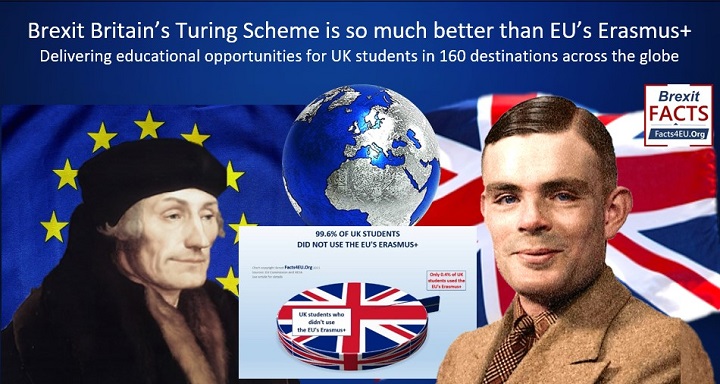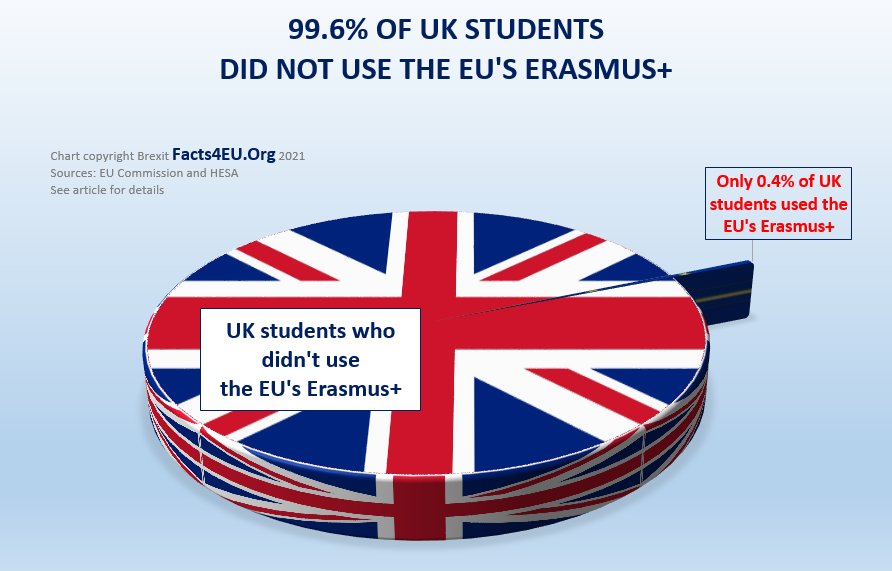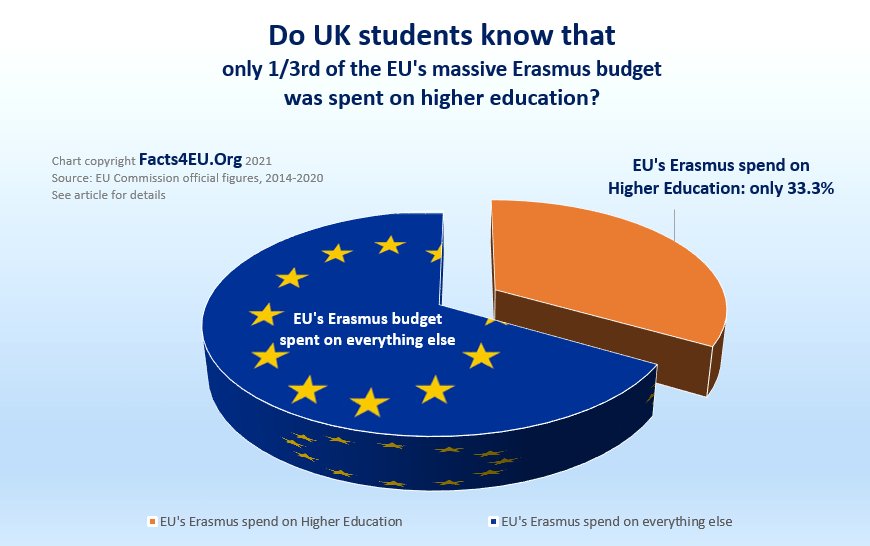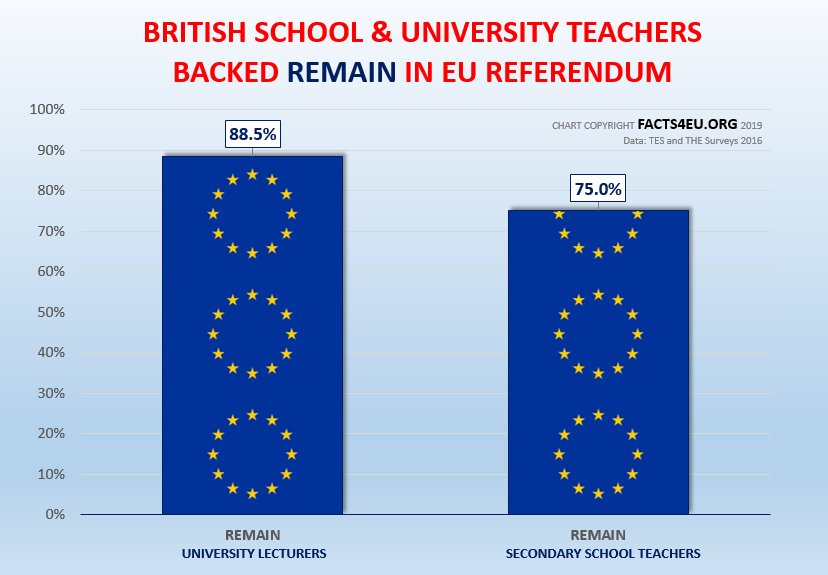THE LAUNCH - ‘Dare to Think Differently' - Re-Energising UK’s Youth - UK’s Turing Scheme vs EU’s Erasmus+
Delivering educational opportunities for UK students in 160 destinations across the globe

Montage © Facts4EU.Org - The EU's Erasmus and the UK's Alan Turing OBE FRS, (codebreaker and inventor of the first stored program computer)
Global opportunities for learning, for the UK's young people - Part One
Just over a week ago on Saturday 15 July 2023 the Government published a statement on the innovative ‘Turing Scheme’ for young people wanting educational opportunities overseas. It received little coverage.
The news is excellent and this scheme is clearly working.
A Brexit Facts4EU three-parter on opportunities for overseas study post-Brexit
Part One : The facts about Erasmus+ (This report)
Part Two : Brexit Britain’s new student programme set out to beat EU’s by over 50% in year one
Part Three : Latest update on Turing Scheme in 2023 – UK’s global alternative to EU’s Erasmus+
A three-part Facts4EU.Org explainer - for students, parents, politicians, and the public
The United Kingdom is no longer part of the EU’s vastly expensive ‘Erasmus+’ scheme for overseas study, which was barely used by British students but used far more by their teachers and lecturers – and by EU students wanting to study for free in the UK.
When the UK left the EU, the Government had already set up an alternative UK scheme to the EU’s Erasmus+. The British scheme is named after the brilliant British mathematician Alan Turing – the key man in breaking the German Enigma code at Bletchley Park in WWII. The Turing Scheme will enter its third year this September, following two successful years since its inauguration.
Brexit Facts4EU.Org outlines the scheme, compares it to the EU’s Erasmus+, and invites all young people to discover the global opportunities open to them, from Australia to the USA to Zimbabwe.
The series summary
Just under two years ago Brexit Facts4EU.Org produced two definitive reports on Erasmus+ and on the UK’s Turing Scheme.
Looking back today, they stand the test of time. We have adapted these reports and we will end with an update and hopefully some comments from the Minister for Skills, Apprenticeships and Higher Education, the Rt Hon Robert Halfon MP.
Today we look at what we left when we left the EU, and why we should not go back. Erasmus+ was never delivering for the UK’s students – but we paid handsomely for it.
With the UK taking seven out of the ten top places in the Times’ list of “Best universities in Europe 2021”, it is clear that the EU needs the UK far more than the UK needs the EU, when it comes to student exchanges. No wonder the Higher Education Statistics Agency (HESA) reports that an astonishing 143,000 students from the EU27 were studying in the UK in the academic year 2018/2019. (Note: All figures for student numbers in this report are for the pre-Covid year - 2018/2019.)
In this report we answer the following key questions
- Is Erasmus+ a university student exchange programme?
- How many UK students have actually benefited?
- How much of the Erasmus budget did the EU actually spend on students?
- How much has it cost the UK taxpayer?
- What is Erasmus+ and why is it dangerous?
- How many UK university staff have taken advantage of it?
Photo right: Former EU Commission President Jean-Claude Juncker was rather keen on his youth initiatives. Photo © EU Commission

1. Is Erasmus+ a university student exchange programme?
No, it is not. Here is how the EU Commission describes it:
“Erasmus+ is the EU's programme to support education, training, youth and sport in Europe.”
“It is open to school pupils, higher education and vocational education and training students, adult learners, youth exchanges, youth workers and sport coaches.”
This is not a description of an exchange programme, allowing students at UK universities to spend part of their degree courses at EU universities. It is a far wider programme, involving sport, youth and adult work, and other activities, and it is vastly expensive, costing billions. (See below.)
2. How many UK university students actually benefited from Erasmus+?
This is the key question. How many students benefited from the billions the UK spent with the EU on the Erasmus+ programme?
Brexit Facts4EU.Org Summary
99.6% of UK students didn’t even use the EU’s youth system, while EU27 students benefited hugely
© Facts4EU.Org - click to enlarge
- Erasmus+ was used by only 9,993 UK students in the pre-Covid year of 2019 [Source: EU Commission]
- That's less than 10,000 out of a total of 2,383,970 higher education students in the UK [source:HESA]
- Only 0.4% of UK students in higher education used the EU's Erasmus+
- 99.6% of UK students did not even use it at all
- This alone makes the costs completely unjustifiable
3. How much of the Erasmus budget did the EU spend on students?
A full two-thirds of the Erasmus+ budget isn’t for any form of exchanges for young people at all. It’s for “partnerships and reforms of the education and youth sectors.” Only one-third of the budget is for “learning opportunities abroad for young people”.
© Facts4EU.Org - click to enlarge
4. How much did it cost UK and EU taxpayers?
In 2019, the UK received only €87m (c.£79 million GBP) in grants for higher education students. This is out of a total EU budget for Erasmus+ of €16.4 billion over the period 2014-2020, an average of €2.34bn euros per year or c.£2 billion pounds per year. This includes the 'extras' which the EU spends for Erasmus+ outside the EU.
These already huge costs have risen dramatically, as the Erasmus budget has been increased by an eye-watering 74%. The new budget (including the extras) is €28.4bn compared to 16.38bn in the last budget.
In 2021 the UK Government pledged £110m (GBP) for the new Turing Scheme to replace Erasmus. This is 39% more than the £79 million the UK received back for its students, from its contributions to the EU under Erasmus+.
The UK taxpayer was funding Erasmus+ to the tune of approximately £266 million pounds per year.
Had the UK stayed in the EU, this would now have increased to approximately £463m per year.
We should also point out that €1.7bn of the EU’s budget went to other countries outside the EU, as part of the EU’s ‘External Action’ programme. This carried on throughout 2020, despite the UK having no say in how the money was spent.
5. So what really is Erasmus+, and why is it dangerous?
Erasmus+ is part of the “EU Youth Strategy” and the “European Education Area”. Here is what the EU Commission has to say about these.
“The EU Youth Strategy should contribute to realising this vision of young people by mobilising EU level policy instruments as well as actions at national, regional and local level by all stakeholders.”
“Erasmus+ doesn't just have opportunities for students… it has opportunities for a wide variety of individuals and organisations…. Erasmus+ also aims to promote the sustainable development of its partners in the field of higher education, and contribute to achieving the objectives of the EU Youth Strategy.”
In October 2020 the EU Commission announced that it would be completing a “European Education Area” by 2025, thereby moving one further step towards the homogenisation of the formerly independent nation states of Europe.
For years the EU has been achieving its goal by targeting young people with continuous propaganda and ‘initiatives’ as we have reported many times before. Here is what they said about their latest move:-
“The European Education Area is underpinned by six dimensions: quality, inclusion and gender equality, green and digital transitions, teachers, higher education, a stronger Europe in the world. Initiatives will inter alia look at ways to enhance quality, notably with regard to basic and digital skills and to make school education more inclusive and gender sensitive and improve school success. They will help strengthen understanding of climate change and sustainability, foster the greening of education infrastructure, support the teaching profession, further roll out European Universities and enhance connectivity among education and training institutions.
“The Communication sets out the means and milestones to achieve the European Education Area by 2025, supported by Europe's Recovery Plan (NextGenerationEU) and the Erasmus+ Programme.”
In short, Erasmus+ is not a student exchange programme. It is part of a concerted strategy from the EU Commission to indoctrinate the youth of Europe.

We still need to raise funding for the editing of our 'The Independence Documentary'
Together with our partners at CIBUK.Org, we've organised a TV-style documentary with a stellar line-up of well-known politicians and all kinds of interesting people, young and old, men and women, white and ethnic origin, presented by Alexandra Phillips.
Alex will be known to many readers as an ex-GB News presenter and a frequent sight on everything from Question Time to Talk TV.
We have finished filming - now we have the long task of editing by our professional production team, if we can get some extra funding. This is going to be big!
Please help today if you can: click here to read more
6. How did the teaching staff do out of Erasmus+?
Our analysis shows that the UK's pro-EU and anti-Brexit teaching staff who are so in favour of Erasmus+ benefited rather more than their students.
According to the EU Commission a total of 3,962 UK teaching staff used Erasmus+ in 2019. With HESA reporting total staff numbers of 217,065 this equates to 1.8% of the teaching body - a take-up of more than four times the proportion of their student population.
Perhaps this helps to explain the huge proportion of the teaching profession who voted to Remain.
UK teaching staff are massively anti-Brexit
- 75% of secondary school teachers backed Remain
- Nearly 90% of university lecturers backed Remain
© Brexit Facts4EU.Org - click the chart to enlarge
Above is how the teaching profession voted in the EU Referendum, according to the Times Educational Supplement survey at the time.
Observations
Believing in the young people of the United Kingdom
The Facts4EU.Org team believe strongly in the importance and power of education. When it comes to student exchanges, we believe these are hugely beneficial - both to the students concerned and to the effect these can have on mutual understanding and good relations between countries in the future.
In the long campaign we have waged against the EU's Erasmus+ we have been careful to stress that educational opportunities for British young people to study abroad are vital. We also value very highly the positive impact of large numbers of future world leaders and influencers who came to the UK as part of their studies when they were young.
To students and young people reading this
Our criticisms have been solely confined to the EU's Erasmus scheme: its ideological motives, its inefficient use of resources, and its huge spread into areas which have nothing to do with the basic premise of student exchanges. We would like to think that as the only Brexit organisation which has conducted a consistent campaign to inform MPs about the true nature of Erasmus, we made a difference.
It is early days for the Government's new Turing Scheme. We will apply our customary analysis to all of this, if we are still around to do so.
Can we and should we carry on?
Finally, we are struggling and we need your help. We have far more to do in researching, publishing, campaigning and lobbying Parliament than we have in terms of the financial resources to fulfil these tasks. We rely 100% on public donations from readers like you. Unlike the Remain/Rejoin camp, we do not have foreign billionaires to subsidise our work.
If you believe in a fully-free, independent, and sovereign United Kingdom, please make a donation now. It’s quick, secure, and confidential, and you can use one of the links below or you can use our Donations page here. You will receive a personal, friendly ‘thank you’ from a member of our team within 24 hours. Thank you so much if you can help to keep us going in these critical months ahead.
[ Sources: EU Commission | Higher Education Statistics Agency | Times Educational Supplement | UK Dept of Education ] Politicians and journalists can contact us for details, as ever.
Brexit Facts4EU.Org, Mon 24 July 2023
Click here to go to our news headlines
Please scroll down to COMMENT on the above article.
And don't forget to actually post your message after you have previewed it!
Since before the EU Referendum, Brexit Facts4EU.Org
has been the most prolific researcher and publisher of Brexit facts in the world.
Supported by MPs, MEPs, & other groups, our work has impact.
We think facts matter. Please donate today, so that we can continue to ensure a clean Brexit is finally delivered.
Paypal Users Only - Choose amount first
Quick One-off
Monthly





Something to say about this? Scroll down for reader comments